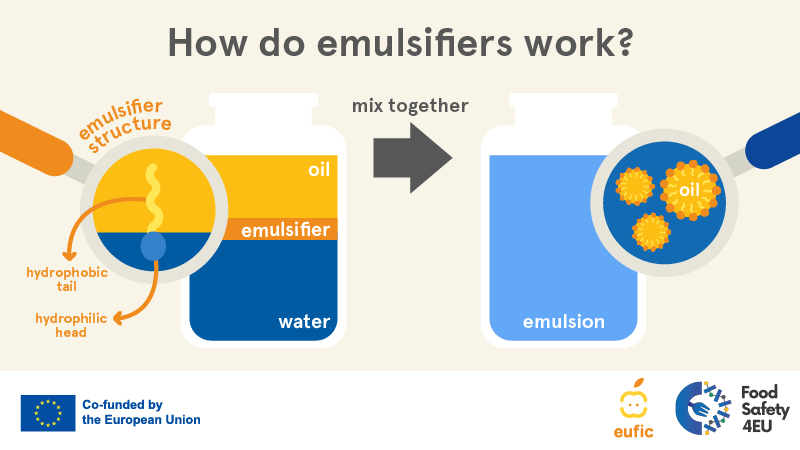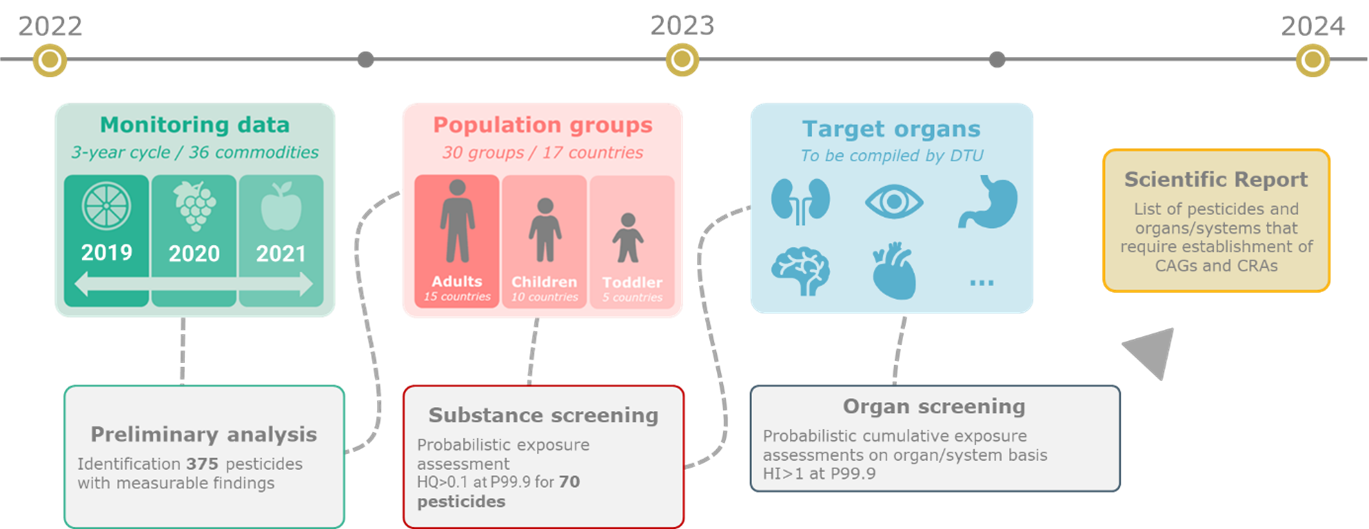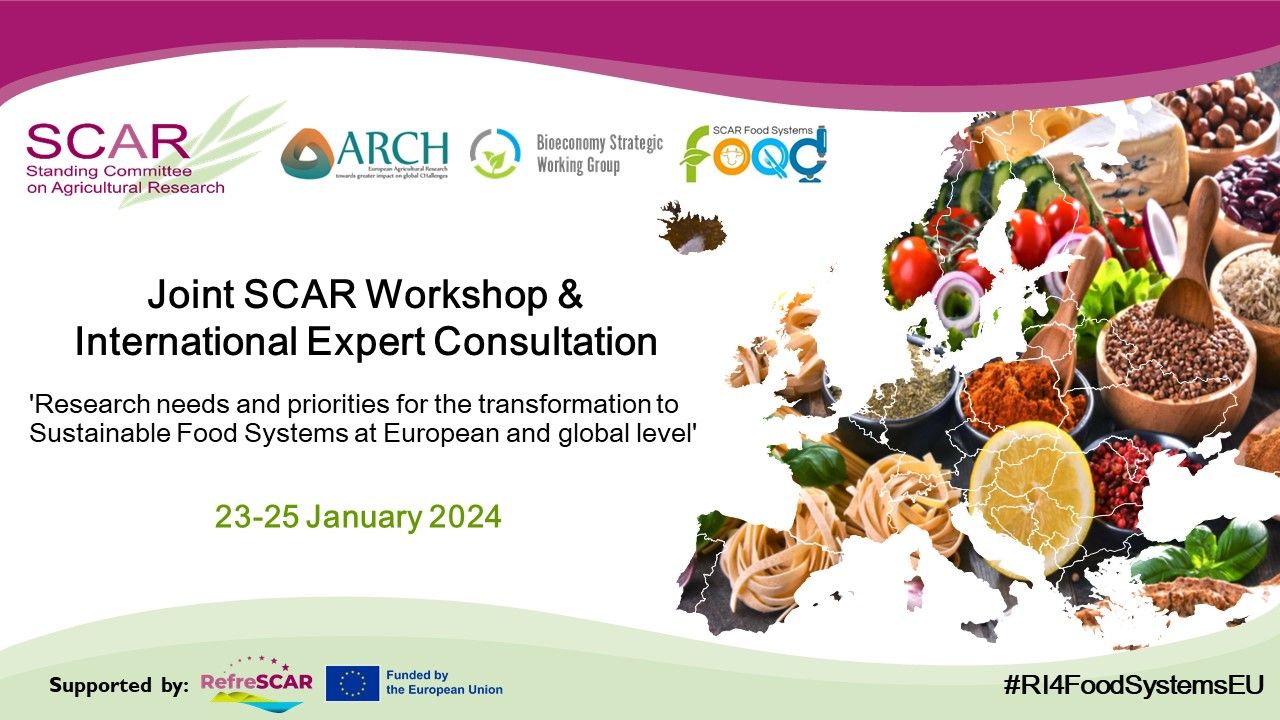What are emulsifiers and what are common examples used in food?

Read in other languages: FR | IT | DE | ES
Add oil to water and the two liquids will never mix. At least not until an emulsifier is added. Emulsifiers are the key to why the oil doesn’t separate from the vinegar in mayonnaise, why chocolate can be moulded and shaped into different chocolate bars, and why bread doesn’t turn stale as easily. This article explores what emulsifiers are and in which food products they play a vital role.
What are emulsifiers and how do they work?
Emulsifiers are food additives used to help mix two substances that typically separate when they are combined (e.g., oil and water).1,2 Emulsifiers have one water-loving (hydrophilic) and one oil-loving (hydrophobic) end. When they are added to an unmixable liquid, the emulsifier molecules position themselves along the so-called interfacial layer where the oil separates from the water. Here, the emulsifier is positioned in such a way that their hydrophilic end faces towards the water phase and their hydrophobic end faces the oil phase, making it possible for the water and oil to become finely dispersed in each other. In the end, the emulsifier creates a stable, homogenous, and smooth emulsion.

Emulsifiers play an important role in the manufacture of food products, enhancing their appearance, taste, texture, and shelf life.1,2 Nowadays, many of the foods we consume, such as margarine, mayonnaise, creamy sauces, candy, packaged processed foods, confections, and a range of bakery products, will not have the same properties without the addition of an emulsifier.
What are different types of emulsifiers?
Emulsifiers currently used in food production are either purified natural products (either from plant or animal origins) or synthetic chemicals that have very similar structures to the natural products.2 For example, the emulsifier lecithin (E322), which is widely used in chocolate products, can be sourced from soybeans (oil), eggs, liver, peanuts, and wheat germ.3 Pectin (E440), also a widely used emulsifier, can also be naturally found in fruits such as apples and pears.4
Currently, around 60 additives in the category ‘emulsifiers, stabilisers, gelling agents, and thickeners’ are permitted in the EU.5
Examples of widely used emulsifiers in the EU:6-18
| E-number | Substance/class | Some foodstuffs in which they are commonly used |
| E322 | Lecithin | Chocolate products |
| E407 | Carrageenan | Flavoured milk, iced coffee, dairy-based ice cream and frozen desserts, chilled desserts, cream |
| E412 | Guar gum | Dairy-based products, soy-based products, water-based frozen desserts, sandwich fillers and spreads, salad products |
| E415 | Xanthan gum | Mayonnaise, sandwich fillers and spreads, salad products, dressing and vinegar, table sauces |
| E432-436 | Polysorbates | Fine bakery wares, milk and cream analogues, ice cream, desserts, sugar confectionery |
| E460-469 | Celluloses, including carboxymethylcellulose | Vitamin & dietary supplements, artificial sweeteners, meal replacements & other drinks, water-based ice lollies, pops & sorbets, meat substitutes |
| E471 | Mono- and diglycerides of fatty acids | Dairy-based ice cream and frozen yoghurt, margarine, cakes, pastries, frozen desserts, sandwiches and wraps |
| E473-474 | Sucrose esters and sucroglycerides | Gum, plant-based ice cream & frozen yoghurt, pastilles, gums, jellies & chews, plant-based drinks, snack/cereal/energy bars |
| E475 | Polyglycerol esters of fatty acids | Cakes, pastries & sweet goods, sweet biscuits/cookies, baking ingredients & mixes, frozen desserts |
| E476 | Polyglycerol polyricinoleate | Chocolate products, dairy-based frozen products, margarine & other blends |
| E481-482 | Stearoyl lactylates | Fine bakery wares, breakfast cereals, desserts, bread |
| E491-E495 | Sorbitan esters | Cakes, pastries & sweet goods, baking ingredients & mixes, chocolate products |
What are common applications of emulsifiers in food?
Bread
It is possible to make bread without emulsifiers but the result is often dry, low in volume and easily stales.2 As little as 0.5% emulsifier added to the dough is enough to achieve an enhanced volume, a softer crumb structure and a longer shelf-life. There are two types of emulsifiers used in bread: dough strengtheners (e.g., diacetyl tartaric acid esters (E472e) and sodium or calcium stearoyl-2-lactylate (E481, E482)) and dough softeners (e.g., mono- and di-glycerides of fatty acids (E471)). Dough-strengthening agents make the dough stronger and result in bread with an improved texture and volume. Dough-softening agents allow obtaining a softer crumb structure and increased shelf-life.
Chocolate
All chocolate products contain 0.5% of lecithin (E322) or ammonium phosphatide (E442). These emulsifiers are added to provide the right consistency of the chocolate.1 As a result, the chocolate can be moulded into plates of chocolate, chocolate bars etc. If the chocolate has been stored at too high temperatures, its surface may appear dull or white. This is called ‘bloom’ which makes the product less attractive to the customer. Sorbitan tristearate (E492) can delay the development of bloom.1
Ice-cream
Ice-cream is one of the most complex foods we encounter, containing ice crystals, air, fat particles, and an unfrozen aqueous mix.2 Emulsifiers are added during the freezing process, to promote a smoother texture and ensure the ice-cream does not melt rapidly after serving. They also improve freeze-thaw stability. Mono and diglycerides of fatty acids (E471), lecithin (E322) and polysorbates (E432, E436) are commonly used in ice-cream production. All this applies to other desserts such as sorbet, milkshake, frozen mousse and frozen yogurt as well.
Margarine
Emulsifiers give margarine the required stability, texture and taste.2 To ensure that the water droplets are finely dispersed in the oil phase, mono and diglycerides of fatty acids (E471) and lecithin (E322) are widely used. Citric acid esters of mono and diglycerides:
- (E472c) prevent the margarine from splattering while polyglycerol esters
- (E477) and lactic acid esters make up for the good quality of margarine used to bake cakes, for example.
Processed meat
Sausages dominate Europe’s processed meat industry. The main components of sausages are meat proteins, fat and water, which are bound together in a stable emulsion.2 Emulsifiers stabilise this emulsion and distribute the fat finely throughout the product. And in low-fat meat products, food additives are responsible for making them as pleasant as their full-fat counterparts. The food industry uses mono and diglycerides of fatty acids (E471) and citric acid esters (E472c) for manufacturing processed meat.
Legislation
Just like any other food additive, emulsifiers are subject to stringent EU legislation governing their safety assessment, authorisation, use and labelling.18 These legislations require all added emulsifiers, as all food additives, to be specified on the labels of products where they are used, either by their name or their corresponding E-number. Additionally, they must be preceded by the technological function (e.g., emulsifier: E466 or emulsifier: carboxymethylcellulose).
Summary
Emulsifiers are food additive molecules that act as a stabilizer for emulsions, preventing liquids that normally don’t mix from separating. Emulsifiers are abundant in the food supply, playing an important role in enhancing the appearance, texture, and shelf-life of many of the foods we consume today.
References
- Cox, S., Sandall, A., Smith, L., Rossi, M., & Whelan, K. (2021). Food additive emulsifiers: a review of their role in foods, legislation and classifications, presence in food supply, dietary exposure, and safety assessment. Nutrition Reviews, 79(6), 726-741.
- Hasenhuettl, G. L., & Hartel, R. W. (Eds.). (2008). Food emulsifiers and their applications (Vol. 19). New York: Springer.
- Zeisel, S. H. (1981). Dietary choline: biochemistry, physiology, and pharmacology. Annual review of nutrition (USA).
- EFSA Panel on Food Additives and Nutrient Sources added to Food (ANS), Mortensen, A., Aguilar, F., Crebelli, R., Di Domenico, A., Dusemund, B., … & Woutersen, R. A. (2017). Re‐evaluation of pectin (E 440i) and amidated pectin (E 440ii) as food additives. EFSA Journal, 15(7), e04866.
- Food Standard Agency. (2022). Approved additives and E numbers. Retrieved from https://www.food.gov.uk/business-guidance/approved-additives-and-e-numbers#emulsifiers-stabilisers-thickeners-and-gelling-agents
- EFSA Panel on Food Additives and Nutrient Sources added to Food (ANS), Mortensen, A., Aguilar, F., Crebelli, R., Di Domenico, A., Frutos, M. J., … & Dusemund, B. (2017). Re‐evaluation of lecithins (E 322) as a food additive. EFSA Journal, 15(4), e04742.
- EFSA Panel on Food Additives and Nutrient Sources added to Food (ANS), Younes, M., Aggett, P., Aguilar, F., Crebelli, R., Filipič, M., … & Dusemund, B. (2018). Re‐evaluation of carrageenan (E 407) and processed Eucheuma seaweed (E 407a) as food additives. EFSA Journal, 16(4), e05238.
- EFSA Panel on Food Additives and Nutrient Sources added to Food (ANS), Mortensen, A., Aguilar, F., Crebelli, R., Di Domenico, A., Frutos, M. J., … & Dusemund, B. (2017). Re‐evaluation of guar gum (E 412) as a food additive. EFSA Journal, 15(2), e04669.
- EFSA Panel on Food Additives and Nutrient Sources added to Food (ANS), Mortensen, A., Aguilar, F., Crebelli, R., Di Domenico, A., Frutos, M. J., … & Dusemund, B. (2017). Re‐evaluation of xanthan gum (E 415) as a food additive. EFSA Journal, 15(7), e04909.
- EFSA Panel on Food Additives and Nutrient Sources added to Food (ANS). (2015). Scientific Opinion on the re‐evaluation of polyoxyethylene sorbitan monolaurate (E 432), polyoxyethylene sorbitan monooleate (E 433), polyoxyethylene sorbitan monopalmitate (E 434), polyoxyethylene sorbitan monostearate (E 435) and polyoxyethylene sorbitan tristearate (E 436) as food additives. Efsa Journal, 13(7), 4152.
- EFSA Panel on Food Additives and Nutrient Sources added to Food (ANS), Younes, M., Aggett, P., Aguilar, F., Crebelli, R., Di Domenico, A., … & Woutersen, R. A. (2018). Re‐evaluation of celluloses E 460 (i), E 460 (ii), E 461, E 462, E 463, E 464, E 465, E 466, E 468 and E 469 as food additives. EFSA Journal, 16(1), e05047.
- EFSA Panel on Food Additives and Nutrient Sources added to Food (ANS), Younes, M., Aggett, P., Aguilar, F., Crebelli, R., Dusemund, B., … & Lambré, C. (2017). Re‐evaluation of mono‐and di‐glycerides of fatty acids (E 471) as food additives. EFSA Journal, 15(11), e05045.
- EFSA Panel on Food Additives and Nutrient Sources added to Food (ANS), Younes, M., Aggett, P., Aguilar, F., Crebelli, R., Dusemund, B., … & Leblanc, J. C. (2018). Refined exposure assessment of sucrose esters of fatty acids (E 473) from its use as a food additive. EFSA Journal, 16(1), e05087.
- EFSA Panel on Food Additives and Nutrient Sources added to Food (ANS), Younes, M., Aggett, P., Aguilar, F., Crebelli, R., Dusemund, B., … & Lambré, C. (2017). Re‐evaluation of polyglycerol esters of fatty acids (E 475) as a food additive. EFSA Journal, 15(12), e05089.
- EFSA Panel on Food Additives and Nutrient Sources added to Food (ANS), Mortensen, A., Aguilar, F., Crebelli, R., Di Domenico, A., Dusemund, B., … & Lambré, C. (2017). Re‐evaluation of polyglycerol polyricinoleate (E 476) as a food additive. Efsa Journal, 15(3), e04743.
- EFSA Panel on Food Additives and Nutrient Sources added to Food (ANS). (2013). Scientific Opinion on the re‐evaluation of sodium stearoyl‐2‐lactylate (E 481) and calcium stearoyl‐2‐lactylate (E 482) as food additives. EFSA Journal, 11(5), 3144.
- EFSA Panel on Food Additives and Nutrient Sources added to Food (ANS), Mortensen, A., Aguilar, F., Crebelli, R., Di Domenico, A., Dusemund, B., … & Lambré, C. (2017). Re‐evaluation of sorbitan monostearate (E 491), sorbitan tristearate (E 492), sorbitan monolaurate (E 493), sorbitan monooleate (E 494) and sorbitan monopalmitate (E 495) when used as food additives. EFSA Journal, 15(5), e04788.
- European Parliament and the Council of the European Union. (2008). Regulation (EC) No 1333/2008 of the European Parliament and of the Council of 16 December 2008 on food additives. Off J Eur Union, 354, 16-33.
This article was produced in collaboration with European Food Information Council (EUFIC) as part of a joint food additive campaign.
Latest Articles

Towards holistic, AI-driven emerging risk assessment: catching stakeholders’ needs in Living Labs

Protecting public health: understanding the importance of cumulative risk assessment of pesticides

SCAR consultation workshop on Sustainable Food Systems: highlights from EU FOOD SAFETY PLATFORM

Pioneering advances in the EU Food Safety System: highlights from the first EU Food Safety Forum
Food4Future_cz

New Tools for Preventing Harmful Bacteria in Ready-to-Eat Foods



